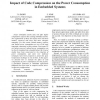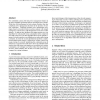204 search results - page 4 / 41 » New 802.11h mechanisms can reduce power consumption |
CSREAESA
2003
13 years 9 months ago
2003
Future embedded systems (ES) will offer higher computation capacity than existing embedded systems. New applications of these ES require more and more memory resources and more an...
RTAS
2000
IEEE
13 years 12 months ago
2000
IEEE
—Many embedded systems operate under severe power and energy constraints. Voltage clock scaling is one mechanism by which energy consumption may be reduced: It is based on the fa...
ICCAD
2004
IEEE
14 years 4 months ago
2004
IEEE
New embedded systems offer rich power management features in the form of multiple operational and non-operational power modes. While they offer mechanisms for better energy effic...
ISVLSI
2002
IEEE
14 years 12 days ago
2002
IEEE
The scaling trend of MOSFETs requires the supply and the threshold voltages to be reduced in future generations. Although the supply voltage is reduced, the total power dissipatio...
DAC
2005
ACM
14 years 8 months ago
2005
ACM
In this work, we propose a new paradigm called power emulation, which exploits hardware acceleration to drastically speedup power estimation. Power emulation is based on the obser...


